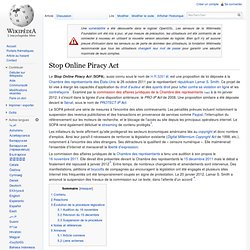

Senate Advances Expanded, "Orwellian" Gov’t Surveillance with FISA Amendments, CISPA. This is a rush transcript.

Copy may not be in its final form. JUAN GONZÁLEZ: The Senate is moving closer to renewing a series of controversial measures that critics say allows government agencies, including the National Security Agency, to monitor your emails and phone calls. Earlier this week, the Democratic-led Senate Select Committee on Intelligence sought to extend controversial amendments to the Foreign Intelligence Surveillance Act that were set to expire at the end of this year.
The amendments were passed in the wake of the Bush administration’s wireless domestic surveillance scandal. Democratic Senator Ron Wyden or Oregon and Mark Udall of Colorado opposed the extension on civil liberties grounds. AMY GOODMAN: Meanwhile, the U.S. What does SOPA mean for us foreigners? The Stop Online Piracy Act is an American piece of legislation, and as a general rule, American legislation has only limited influence outside US borders.

My fellow Europeans might, for example, marvel at the almost proud dysfunction that led to the creation of some American legislation, but ultimately it was irrelevant to us; a sideshow to be watched with bemusement. SOPA is a little different from most legislation, however, in that it has an explicit focus on websites that are, in some sense, "foreign. " SOPA regulates the dealings between American service providers—most notably search engines, advertising networks, and payment processors (such as PayPal, Visa, and MasterCard)—and foreign sites. Search engines will have to remove listings of offending foreign sites; advertising networks will have to stop selling ads to offending sites; payment processors will have to stop processing payments from Americans for offending sites. The recourse such sites would have is limited.
#BlackoutSOPA: How 87,000 People Taught Us About The Future of Online Activism. [Editor’s Note: The Stop Online Piracy Act, the House bill that wants to give content holders vast new powers to block web sites in the name of copyright protection, has been delayed despite an extensive lobbying campaign.

The reason was widespread online opposition. Hunter Walk, co-creator of #BlackoutSOPA, explains in the article below how his site was able to help rally web users to the cause -- and hit upon the new reality of activism in the process.] At 1pm on Monday January 9th, Greg Hochmuth and I launched #BlackoutSOPA, a site that lets you alter your Twitter profile pic to display SOPA opposition. 15 minutes later the site went down due to more traffic than we expected.
That demand was just the beginning. Over the next 10 days, tens of thousands of people used the tool to reach tens of millions of their followers. Stop Online Piracy Act. Un article de Wikipédia, l'encyclopédie libre.

Le SOPA prévoit une série de mesures à l'encontre des sites contrevenants. Les pénalités prévues incluent notamment la suspension des revenus publicitaires et des transactions en provenance de services comme Paypal, l'interruption du référencement sur les moteurs de recherche, et le blocage de l'accès au site depuis les principaux opérateurs internet. Le SOPA rend également délictuel le streaming de contenu protégés[2]. Les initiateurs du texte affirment qu'elle protégerait les secteurs économiques américains liés au copyright et donc nombre d'emplois.
Ainsi leur paraît-il nécessaire de renforcer la législation existante (Digital Millennium Copyright Act de 1998, etc.), notamment à l'encontre des sites étrangers. La commission des affaires juridiques de la Chambre des représentants a tenu une audition à son propos le . Contenu[modifier | modifier le code] Hackers Join Fight Against SOPA. SOPA, Internet regulation, and the economics of piracy.
Earlier this month, I detailed at some length why claims about the purported economic harms of piracy, offered by supporters of the Stop Online Piracy Act (SOPA) and PROTECT-IP Act (PIPA), ought to be treated with much more skepticism than they generally get from journalists and policymakers.

My own view is that this ought to be rather secondary to the policy discussion: SOPA and PIPA would be ineffective mechanisms for addressing the problem, and a terrible idea for many other reasons, even if the numbers were exactly right. Post-SOPA: the path forward for addressing piracy. The number of high-quality services that "compete with free" is growing—and some of the credit is certainly due to the major content conglomerates, which have made it easier to license and use their digital material.

As a recent subscriber to Rdio, it's hard for me to imagine anyone who would even want to go to the hassle of pirating music when 13 million tracks are ready to be dialed up in instant, high-quality streams, complete with album art. For $4.99 a month—the cost of the Web-only unlimited subscription—you would have be one cheap bastard with way too much time on your hands to scour P2P networks instead. Hulu, Netflix, Amazon Instant Video, Spotify, and iTunes are all terrific services that have been well-used in my household; we've even rented HD movies through the Xbox.
All provide a much better experience than the older one of driving to a store and browsing the shelves.